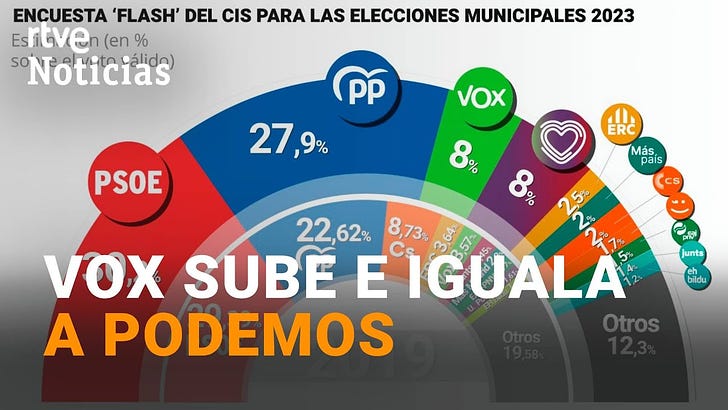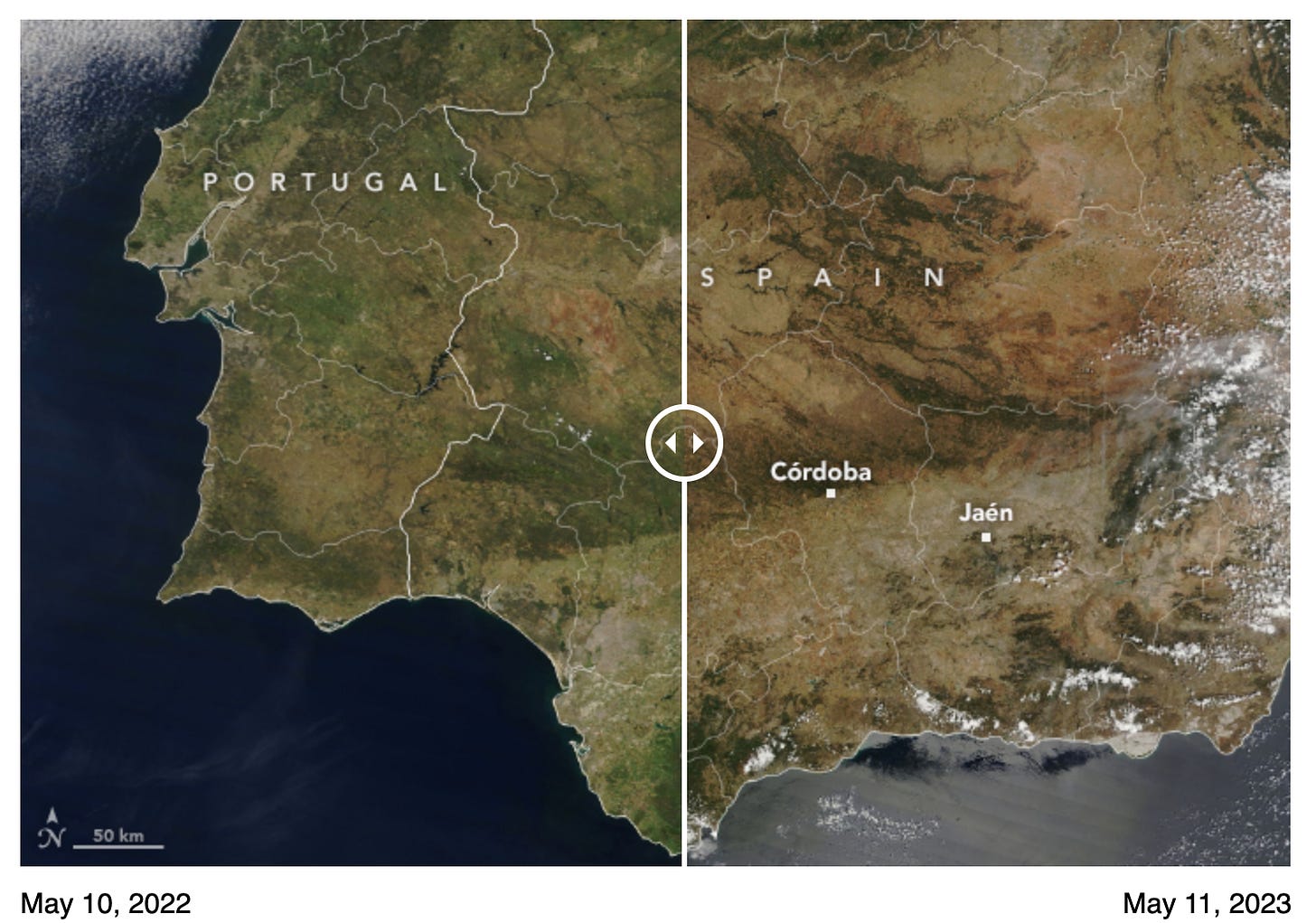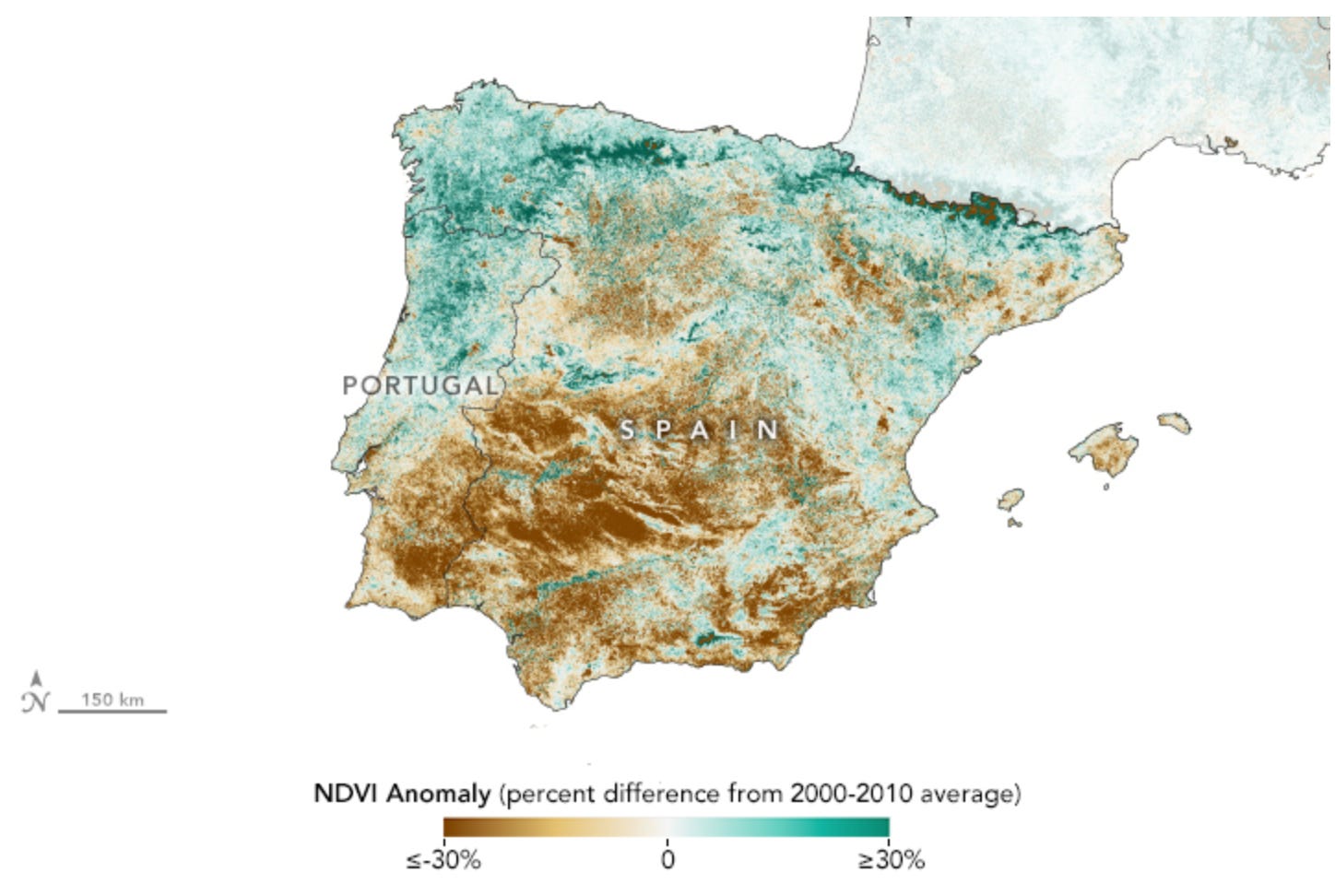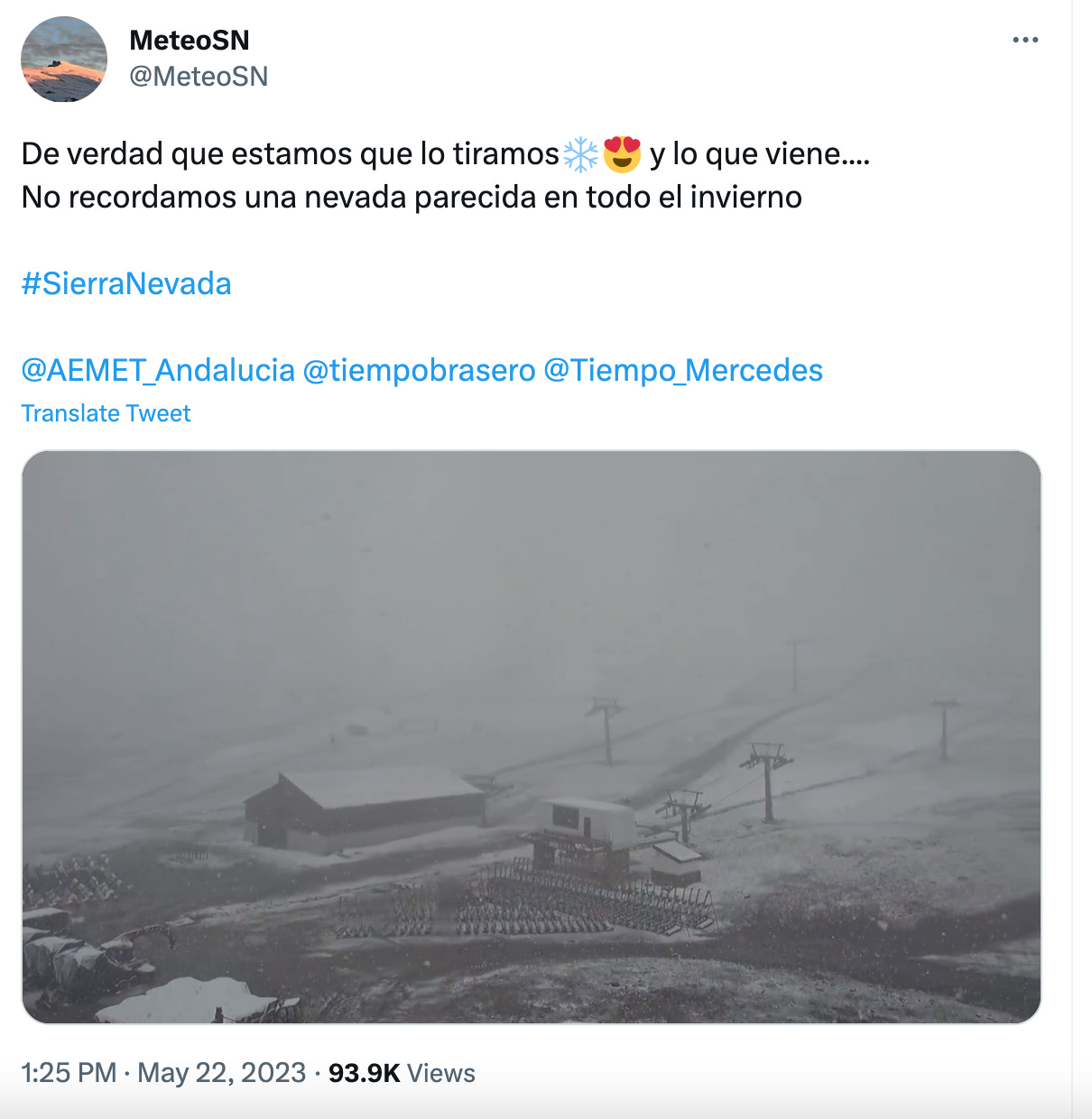🗳️ This Week in Spain: Election Weekend!
Also: Racism in football, more crazy weather and an app for chores.
By @IanMount and @AdrianBono | May 25, 2023 | Madrid | Issue #15
🎉 Welcome to The Tapa, an English-language, weekly newsletter about all things Spain!
🥜 This Week in a Nutshell: We’re three days away from the municipal and regional elections, so brace yourselves this weekend. Also: Is Spain a racist country? The debate is on here and abroad, courtesy of racist football fans.
🙏 Also, it’s a long one today, so if it gets truncated at the bottom of your email, just click on the link to read the rest on Substack.
🕺If you haven’t subscribed yet, please do so by clicking on the button below.
🫶 And if you already have, please send this newsletter around to your friends and family and help us keep growing.
The explainer you were hoping for
🍿 Election Weekend: What You Need To Know
Hallelujah, it’s election time again! Okay, fine, we exaggerate slightly. But this Sunday, May 28—aka 28M—features local and regional elections, and we here at The Tapa are enough politics dorks to feel a little flutter of excitement at the prospect.
Much of the coverage in the lead-up to these elections has focused on them as a dry-run for national elections, which must be held by December—and most likely will be held in December, because Spain holds the EU presidency for the last six months of 2023, and there’s no reason PM Pedro Sánchez would want to mess that up with an election, and end up leaving his star turn early if his PSOE socialists fell from power.
We’re going to focus on the two main stories of that dry-run—and where we’ll see them play out. Namely, a) whether a downtrodden Podemos will survive 28M, because their survival will be key to repeating the current national coalition, and b) whether the center-right PP will be able to form local and regional governments without the far-right Vox, as coalitions with Vox would offer the left a key attacking angle in national elections. We will look at these two stories in three key places: Madrid, Barcelona, and Valencia.
First, though, the state of play. All municipalities will hold local elections on Sunday, as will 12 of Spain’s 17 regional parliaments (the other 5—Catalonia, Galicia, Castilla y León, Andalucía, and Basque Country—held early elections and got off schedule).
OK, on the left, what’s going on with Unidas Podemos? The far-left movement that started with the rise of Podemos in the Spanish political scene in 2014 is, as Tapa friend Guy Hudgecoe notes in this excellent Politico article, fading and desperately looking for votes. Here’s a quick history lesson:.
Podemos rose to prominence as a result of the indignados movement in the early ‘10s (indignados: citizens outraged over the austerity measures that came with the Spanish financial crisis). In 2014, they broke up Spain’s two-party system and became an alternative for voters who were angry over the state of the economy.
Podemos joined forces with the Izquierda Unida (United Left) in 2016 and formed the coalition known as Unidos Podemos (they eventually changed their name to Unidas Podemos in 2019 in recognition of the feminist movement). The party gained significant momentum in the 2015 and 2016 general elections, advocating for progressive policies, social justice, and a new political order.
In the 2019 general elections, the center-left PSOE led by current PM Pedro Sánchez and Unidas Podemos (then led by the now retired Pablo Iglesias) reached a deal to become Spain’s first coalition government since the return of democracy in the late 70s.
But, as Politico explains, things now are very different from what they were then— especially after the “only yes means yes” law fiasco and the rise of SUMAR’s Yolanda Díaz’s as a serious presidential contender:
“Podemos lacks strong leadership, with its credibility undermined by a bungled legislative initiative and at loggerheads with its leftist rivals. As a result, the party goes into these elections weaker than at any time since its foundation.”
And on the right, what’s up with Vox? The far-right, anti-immigrant party made a big splash in 2018 when it won its first regional seats in Andalucía and scrambled Spain’s party system much like Podemos had before it. Since then it’s entered or acted as crucial outside support in PP-led governments from Andalucía to Castilla y León and Madrid.
Unlike Podemos, Vox has not deflated (yet) but it has stagnated—or at least “found its level”—around 10%. That means that if it continues to pull those votes, it will be a necessary part of right-leaning majorities where the PP doesn’t win an outright majority. And therefore a recurring pain for the PP (and many other people, most likely), as Spain’s main right-wing party tries to pick up centrist votes for the December elections.
🔥 3 Hot Races to Follow
Madrid
Current regional governor Isabel Díaz Ayuso of the PP is expected to win an outright majority in the 136-seat regional assembly or at least come close enough that Vox will have little bargaining power in government formation—which you can see by the fact that Vox boss Santiago Abascal has basically given up on Madrid and is campaigning elsewhere. There will be more action on the left, where eyes will be on whether Podemos fails to garner enough votes to win any seats—which some polls predict—and whether Mas Madrid stays ahead of the PSOE as the left’s standard bearer. Unidas Podemos is polling around 5%—and that’s the minimum it needs to have representation.
The Madrid city race is closer. Current PP mayor José Luis Martínez Almeida is expected to easily win the most seats, but could fall short of repeating as mayor if the combined parties on the left manage to squeak out a majority. Más Madrid and the PSOE are not expected to get there alone, but if Unidas Podemos can enter city hall (they are running in the city for the first time) the equation could change. The election could even come down to current vice-mayor Begoña Villacis—if her bedraggled Ciudadanos party doesn’t disappear, she may emerge as the king (or mayor) maker.
Barcelona
En Comú Podem, the local coalition of Podemos in Barcelona (and the party of current mayor Ada Colau), is expected to perform well—but perhaps not well enough to retain the mayoralty. En Comú Podem, the Catalan branch of the PSOE (the PSC); and Junts—a renamed municipal version of the center-right Catalan nationalist/separatist party CIU—are expected to tie, with 10-11 seats each in the 41 seat city hall.
So who will be mayor? If Colau or PSC candidate Jaume Colboni end up ahead and have enough combined seats to form a majority, expect them to do so and name the top vote-getter of the two mayor. If they don’t reach 21 seats, however, you could see ERC (a left-wing Catalan nationalist/separatist party) push the PSC/En Comú pair over the line, or, every stranger, the PSC could join with Junts boss Xavier Trias and the PP (which is expected to get two seats) to form the ultimate “establishment-friendly” coalition. Weird, but true.
One final thing to watch in Barcelona: If Ada Colau doesn’t repeat as mayor, expect her to jump into national politics for the December elections as a SUMAR candidate, aiming for a minister’s role in a PSOE/SUMAR coalition.
Valencia
The Valencian community is currently under the rule of socialist Ximo Puig thanks to a coalition deal between PSOE, Compromís and Unidas Podemos. But while he is hoping to extend his term, the most recent polls suggest things are nearly tied and the PP could lead the region—although it will need help from Vox to reach the 50 votes needed for an absolute majority in the 99-seat regional assembly.
The polls predict the PP will go from 19 to 35 seats on Sunday (this big jump mostly due to the collapse of Ciudadanos, which currently has 18 seats). Meanwhile, Vox is expected to make a 5-seat jump, from 10 to 15. If those numbers remain, then a PP-Vox coalition would reach the 50 seats needed and PP candidate Carlos Mazón would become the new president of the Valencian government.
In the city of Valencia, things are equally uncertain and too close to call. Two-term Mayor Joan Ribó is seeking reelection with the left-leaning coalition Compromís, but latest polls show a PP push that could eventually unseat him and crown María José Catalá as the new mayor of the third largest city in Spain.
🔔 A Message From Our Sponsor
Bucólico Café is a project of connection that was born as a specialty coffee shop.
We value time and understand that it represents both a cycle and an instant—chronology and nostalgia. Bucólico is a space that connects one’s soul with the purity, lightness and beauty of the countryside—while being in the city. Via a cup of coffee, a piece of cake or a song…
Located on Calle de Barbieri 4 — a few blocks from Plaza Chueca — Bucólico reassures the soul with a feeling of home.
Follow Bucólico Café on Instagram.
💬 Five things to discuss at dinner parties this week:
1. Vinicius Jr. and the fight against racism in Spain
The disease that is racism in Spanish football once again showed its very ugly head—and this time it offered a lesson on how not to deal with racist fans. It also became an international scandal. Here’s what happened.
Real Madrid’s Brazilian forward, Vinícius Jr. (Vini) was subjected to racist chants on Sunday while his team was playing against Valencia at the Mestalla Stadium in La Liga (Spain’s First Division national football league).
A furious Vini identified a spectator who had been hurling racists insults at him minutes before the end of the second half. The game was briefly interrupted and eventually resumed after Vini agreed to rejoin. But when the racist chants continued, his Real Madrid teammates got involved, Valencia’s Hugo Duro clashed with the Brazilian forward, and during the confusion, the referee pulled out a red card for Vini, kicking him out of the game. The match ended with Valencia defeating Real Madrid 1-0.
An understandably outraged Vini took to Twitter to say that today, in Brazil, Spain is now known as a “country of racists”, adding that “racism is normal in La Liga”. He also said that the championship “which was once that of Ronaldinho, Ronaldo, Cristiano and Messi, now is one of racists”.
The tweet spread like wildfire (he has 6.8m followers). And while many condemned the racist chants against him, there was someone who decided to come out and criticize Vini instead: the president of La Liga, Javier Tebas.
In one of the world’s most epic tone-deaf tweets, Tebas told the Brazilian player that “before criticizing and slandering LaLiga, you should be better informed”, in reference the the anti-racism work that the league has—allegedly—been doing. Vini tweeted back saying, “I’m not your friend to discuss racism. I want actions and punishments.” (Tebas later apologized for his “misunderstood” tweet.)
Many Brazilian and Spanish officials came out in Vini’s defense, as did premier players from around the world. Even FIFA president Gianni Infantino commented on the case, adding that there is “no place for racism in football or in society.”
Vini Jr., who has been in Spain for five years, has led a crusade against racism since 2017, when during a Botafogo—Flamengo match in Rio, his family suffered a racist attack while he was playing. Since then he has launched a foundation in Brazil, Instituto Vini Jr. that raises awareness among public school teachers, on how to fight racism.
Carlo Ancelotti, Real Madrid's Italian manager, addressed the racist abuse that Vini endured in a press conference following the game on Sunday, pointedly refusing to talk about the game in order to focus on racism in Spain.
Even Brazilian president Lula da Silva took time during the G-7 summit in Hiroshima to ask La Liga to take “serious measures” against racist fans. “We can’t allow fascism and racism to take over football stadiums,” he said.
The Royal Spanish Football Federation’s Competition Committee announced a series of sanctions against Valencia after a meeting on Tuesday: a €45,000 fine (the highest ever given to a club over their supporters’ racist attitudes) and the closure of the stands in the Mestalla stadium where the racist chants came from.
Also on Tuesday, the National Police tweeted that they had arrested three suspects in the Valencia area aged 18 to 21 in connection to the racist chants. And four Atlético de Madrid “ultras” were arresting for hanging an effigy of Vinicius from a bridge in a previous incident. (Spanish justice, often slow, can move quickly when pushed.)
Nine formal complaints have been filed against fans in connection with racist attacks on Vini in the past.
Ultimately, the question here is about how racism is dealt with in Spain—and how Spain admits this is a problem. There is a common mindset among football fans that “anything I can do to unsettle an opposing player is just gamesmanship” but, really, when that unsettling involves directly suggesting the opposing player is less than human—i.e. a monkey—it’s just wrong. That’s pretty clear, right? No vale todo.
2.🗳️How to engage in real voting fraud, Melilla-style
Spain’s Policía Nacional arrested 10 people this week for election fraud in Melilla. That is, real honest-to-god vote buying, not Trump/Kari Lake “It was election fraud because I lost” fraud.
The tip-off was pretty straightforward: a crazy number of Melillenses asked to vote by mail. That is, 11,707 people in the tiny autonomous city of Spain that is in Africa asked to vote by mail—about 21.2% of voters. The average percentage for Spain is 2.8%. Sorta high, right?
So why were so many Melillenses eager to vote by mail? Oh, right, €€€! Vote “buyers”—mostly low-level operators in the hashish trade—offered poor residents between €50 and €200 for their vote. All they had to do was go to the post office, show their DNI, and request a by-mail ballot. When they got it, they handed it over (“You’ll vote for me? How nice!”) and got paid. Many of the 10 arrested this week were those mules.
But people don’t just buy votes for the fun of it, right? Of course not. The fraud bosses arrested were Mohamed Ahmed Al Lal, a city government minister and the #3 on the ballot for Coalición por Melilla (CpM), a PSOE-associated party (it split from the PSOE in 1995 and had strong support among Muslim Melillenses) led by Mustafa Aberchán. Oh, and Aberchán’s son-in-law was also arrested.
The street-level vote buyers, or camellos, thought that Aberchán and more top pols should have been arrested instead of them, the little guys. “Instead of picking up Aberchán or [Juan José] Imbroda [president of the PP in Melilla], you grab us?,” one angry camello detainee said. “We’re here on the street, nothing else…but they are the ones who pay for the votes, and they don’t get taken.”
Though the sheer number of vote-by-mail requests was a big tip, it wasn’t the only one. Several postmen were also robbed of the ballots they had for delivery.
Even before the arrests, two moves started to unravel the plot. The police started escorting the postal workers on their delivery routes (no more robberies!) and the post offices began demanding that people show their DNI when they dropped off their vote in Correos in Melilla (before that, the camellos could deliver piles of votes). Surprise: the number of votes coming in plunged, though 700 were accepted before the change.
And one more tip-off: it happened before! CpM boss Mustafa Aberchán and the ex-general secretary of the PSOE in Melilla, Dionisio Muñoz Pérez, were sentenced to two years in jail for buying mail-in ballots for a Senate election in 2008. (Hassan Driss and Javier Lence of the PP were tried but found not guilty.)
BONUS ROUND: El Mundo reports that seven people were arrested in another vote-buying case in the Andaluz town of Mojácar, two of whom were PSOE candidates.
3.🌧️ Talking about the weather…
Spanish weather just can’t make up its mind. After the hottest and driest April since the Earth was formed records started to be kept in 1961, we’ve moved into a truly bipolar May.
Like how split is the weather’s personality? Enough to show what climate scientists mean when they say that climate change doesn’t just mean hotter—it means much more extreme.
Hot and dry were the watchwords this Spring, of course (see the map above comparing vegetation coverage in May 2022 and May 2023). But it’s not just a one-year drop off. In fact, much of southern Spain has significantly less vegetation than the 2000-2010 average as measured by the Normalized Difference Vegetation Index (NDVI). (BTW all maps courtesy of NASA—thank you, NASA.)
NASA explains how dry: “As of May 19, the Córdoba airport had only received about 30% of expected rainfall, compared to the 1981–2010 average. Similarly scant rain fell in Jaén, a few miles east of Córdoba: only 2 centimeters of the expected 12.5 centimeters of rain fell through mid-May (16% of normal).”
That means…expensive olive oil. Andalucía is the world’s largest olive oil producing region, and the province of Jaén is believed to have produced a quarter of the world’s olive oil last year. According to The Times (London), wholesale olive oil prices rose by 11% in April alone, and U.K. shoppers have already seen the price of olive oil jump by 49% over the last year. In Spain, the INE posts the annual price jump at 27.8%.
The drought and crazy heat cut this year’s harvest by more than half, to about 660,000 tons. The farming lobby COAG called it “the worst campaign since 1995-96”. Which is not good.
But it’s not just hot 🔥! Oddly, it’s also now…incredibly wet, with unpredictable consequences.
This week’s biblical rainstorm in Murcia and Valencia (aka DANA, for Depresión Atmosférica aislada en Niveles Altos), dumped more than 100 liters per square meter in parts of the two regions, which is, like, filling a bathtub halfway except the bathtub is Murcia. Unfortunately, El Español reports, rain that falls that hard compacts the soil and runs off—it doesn’t make it to the aquifer to ease the drought. Ommm… 🧘♂️
But the irony (oh, the irony)? There was a massive snow storm over the last week at the Sierra Nevada ski report—in crazy dry Andalucía—bigger than any during the actual ski season.
The good news: Last Tuesday (May 16), a “confluence of exceptional photovoltaic and wind production” allowed the generation of enough green electricity to cover 100% of Spanish peninsular demand for nine hours, the longest such period to date. So plenty of sun and wind is good, right?
4.🏠 Household chores? There’s an App for that, man

Leave it to the government to add one more reason to be hooked to our phones! Because if you were concerned about your addiction to TikTok before (like, literally… it’s a real problem, people) then prepare yourself for… the chores app.
Seriously.
The Ministry of Equality recently announced that in the next few months they will be launching an app to track who is doing what when it comes to household chores. Do you regularly argue with your significant other over who did the dishes last night? Do your roommates complain that they’ve already cleaned the toilet yesterday even though you know they haven’t since 1993?
Yup, now there’s an app for that.
The ministry says the goal is to raise awareness about inequality in the distribution of household chores and promote greater equity within Spanish families. They also hope this app will help track the tasks each family member performs in order to determine the number of hours of domestic work that is carried out by men and women (spoiler alert: you already know the answer).
The app will be ready for download in September and will be available on all phones. With it you and your family will be able to create a simple register of who’s doing kitchen work, who’s going to the supermarket and who’s looking after the children (do rabbits count as children?).
If you’re not into sharing information with the man, this app may not be for you: The ministry says that extracting analytical data from it will help promote “communication opportunities about shared responsibility”, effectively taking a snapshot of who’s doing more in your average home here in Spain. Ministry sources told EFE that they see this as “the seed to building public policies centered on a culture of shared responsibility, which is an outstanding commitment of equality policies.”
Useful or Orwellian? You decide.
5.🔐 Maybe not so end-to-end
The nice thing about text messaging services like WhatsApp and Signal is that no one can listen in, right? Maybe not, if Spain has its way.
Spain stepped in it this week, at least in the eyes of privacy advocates. This week, a European Council survey of member countries’ views on encryption regulation was leaked and…Spain was a bit of an outlier, according to a document uncovered by WIRED.
The survey was about how to craft a law to catch the spread of child pornography. The big question was how to deal with “end-to-end encryption” on services like WhatsApp and Signal, which means that messages can only be accessed by the sender and the receiver.
20 European countries responded to the request for comment, with most saying they wanted to scan encrypted messages in some form to stop child pornography. Which seems plausible.
But Spain had the most maximalist point of view. “Ideally, in our view, it would be desirable to prevent EU-based service providers by law from implementing end-to-end encryption,” Spain said. As in, no end-to-end encryption.
Spain’s view worried privacy advocates who worry that the search for wrongdoing will encourage rampant government snooping. “It is shocking to me to see Spain state outright that there should be legislation prohibiting EU-based service providers from implementing end-to-end encryption,” Riana Pfefferkorn, a research scholar at Stanford University’s Internet Observatory told WIRED.
Similarly, Spanish media El Confidencial called the move “very worrying”.
Diego Naranjo, head of public policy at the NGO European Digital Rights told elDiario, “Under the laudable intention of preventing the dissemination of illegal content, there is a direct threat to the confidentiality of communications, since companies like WhatsApp, TikTok, Instagram or Signal will be forced to create security holes and, those that use them, give over the encryption of communications.”
The issue is not so much the need to crack down on child pornography—a goal pretty much everyone supports—but rather Spain’s occasionally cavalier and obtuse attitude to free speech. The government’s reaction to public protests over the “Ley Mordaza” (Gag Law) that put heavy restrictions on protests near parliament and on photographing police suggest that Spain’s government often does not think through the broad surveillance and control powers it requests in law.
🙏 Before you go, please remember to share this newsletter with your friends on social media. The more we grow, the more information we’ll be able to offer each week.
We’ll be back next week with more.








